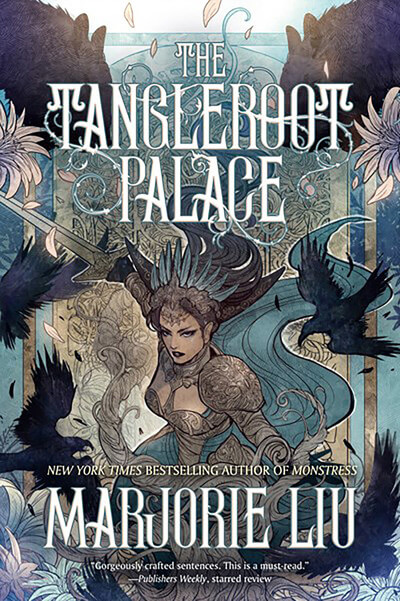The Book Eaters, Sunyi Dean’s debut, is a dark, haunting fantasy that follows Devon Fairweather, a Book Eater who subsists on ink and paper and the knowledge it provides her. The Book Eaters, or ‘eaters, live on the fringes of human society, and were it not for the special, fang-like teeth that they unsheathe before a literary meal, they would look like ordinary people. Devon has always detested the staunch traditions of her isolated clan, and The Book Eaters jumps back and forth in time as she tries to forge her own path.
One of the most memorable and haunting elements of Dean’s world is how Book Eater society is structured around elements of Arthurian legend that are used to justify patriarchal, tyrannical rule. The young Devon lives a sheltered life as a Princess. Female Book Eaters are rare, and she is expected to marry early and promptly give birth to more of their kind. While her brothers eat books about politics, history and academics, she is limited to the same old fairy tales time and time again. Knights maintain order and govern the Dragons, who are born as Mind Eaters, unpredictable individuals who constantly crave human souls. Drugs keep their hunger at bay and force them to submit to their handlers’ orders.
Devon has always seen through the facade of the happily ever afters she consumes, and when she gives birth to a Mind Eater son, Cai, she realizes she is the only person who can save him from becoming a Dragon. In the present timeline, Devon and the now 5-year-old Cai have escaped the ‘eaters, but Devon is struggling to keep him under control and out of the Knights’ grasp while she searches for a way that they can both be free for good.
Dean fully invests readers in Devon’s struggles, both as a girl attempting to prise tiny snatches of freedom from a patriarchal society and as an adult mother frantic to protect her son. The Book Eaters‘ depiction of the sacrifices and joys of motherhood is particularly nuanced, grounding the fantasy elements of the story in the relationship between Devon and Cai. And Dean expertly expands the scope of the story to explore even more characters’ experiences, such as the other ‘eater women’s oppression and loneliness, Devon’s friend Yarrow’s isolation as an asexual person in the procreation-obsessed ‘eater society and Cai’s pain at being viewed as a monster.
The Book Eaters is a far cry from the fairy tales Devon consumes: It is a winding, harrowing, deliciously nightmarish story of people taking control of their bodies and destinies after generations of repression and abuse.


















